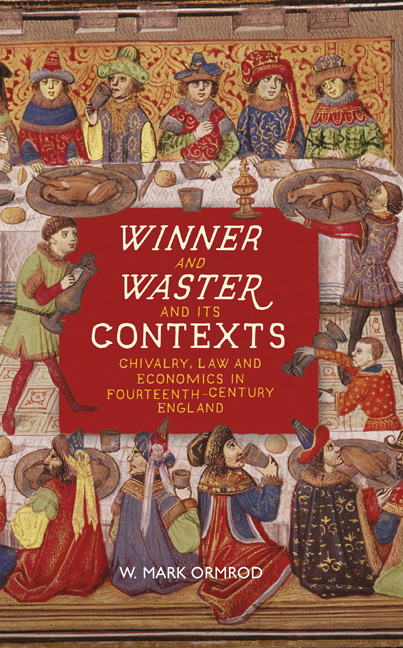Book contents
- Frontmatter
- Contents
- Acknowledgements
- Note on Editions
- List of Abbreviations
- Introduction: Winner and Waster: A Poem on the Times
- 1 Chivalry and Internationalism: The Garter Feast of 1358 and English Diplomacy during the 1350s and 1360s
- 2 Treason, Public Order and Dispute Settlement: The Statute of Treasons of 1352 and Royal Arbitration
- 3 Landed Society, Conspicuous Consumption and the Political Economy: The Sumptuary Laws of 1363
- 4 The Private and the Public Spheres: The Royal Household and State Finance under Edward III
- 5 Satire, Complaint and Authorship: Winner and Waster and the Alliterative Revival of the Fourteenth Century
- 6 Winner and Waster: Timeliness and Timelessness
- Appendix 1 Timeline, 1337–70
- Appendix 2 A Modern English Version of Winner and Waster
- Bibliography
- Index
- Publisher̕s Note
5 - Satire, Complaint and Authorship: Winner and Waster and the Alliterative Revival of the Fourteenth Century
Published online by Cambridge University Press: 09 April 2021
- Frontmatter
- Contents
- Acknowledgements
- Note on Editions
- List of Abbreviations
- Introduction: Winner and Waster: A Poem on the Times
- 1 Chivalry and Internationalism: The Garter Feast of 1358 and English Diplomacy during the 1350s and 1360s
- 2 Treason, Public Order and Dispute Settlement: The Statute of Treasons of 1352 and Royal Arbitration
- 3 Landed Society, Conspicuous Consumption and the Political Economy: The Sumptuary Laws of 1363
- 4 The Private and the Public Spheres: The Royal Household and State Finance under Edward III
- 5 Satire, Complaint and Authorship: Winner and Waster and the Alliterative Revival of the Fourteenth Century
- 6 Winner and Waster: Timeliness and Timelessness
- Appendix 1 Timeline, 1337–70
- Appendix 2 A Modern English Version of Winner and Waster
- Bibliography
- Index
- Publisher̕s Note
Summary
It has long been appreciated that W&W presents a satire upon the behav¬iours of the ruling elite, exposing as it does both the greed of the upper orders of society and the recklessness of their lavish lifestyles. The question therefore arises as to how W&W compares with other literary works of social commentary and political complaint of the period. The fourteenth century saw a flourishing of such works, many of which (like W&W) survive only in single manuscripts; had more of the ephemeral literature of the period come down to us, the modern understanding of the authorship, content and reception of complaint literature would not only be all the greater, but possibly rather different in its assumptions around such issues as authorship and audience. There is a sufficient corpus of material, however, to give a strong indication of the nature of this genre over the reigns of the first three Edwards, and to provide the starting-point for a consideration of W&W's own identity as a ‘complaint’ poem.
The previous chapters have emphasised that the immediate message of W&W relates not to the hardships of the lower orders but to the respon¬sibilities of the higher levels of society, and to the lesser landed classes or gentry in particular. Pace Harwood's thesis about the anxiety of the poet over the presumptuousness of the peasantry in the aftermath of the Black Death, we have observed that direct criticism of the lower orders is generally omitted from the text. Similarly, the representation of the merchant class is limited, and shies away from the stereotypes of contemporary literature that often present the commercial classes as unscrupulous profiteers and comi¬cal social climbers. Instead, there sit within the poem a series of grounded assumptions about a well-ordered society in which peasants and lords (not to mention clerics and merchants) understand their own positions in the grand scheme of things and are properly mindful of their resulting social obligations towards others.
At first sight, this decidedly conservative viewpoint seems at odds with some recent interpretations of the complaint literature of the period.
- Type
- Chapter
- Information
- Winner and Waster and its ContextsChivalry, Law and Economics in Fourteenth-Century England, pp. 105 - 130Publisher: Boydell & BrewerPrint publication year: 2021

